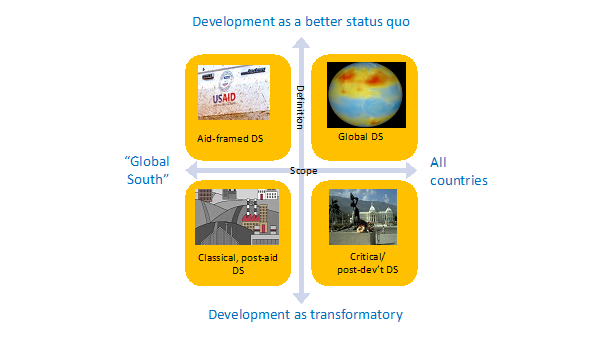By Andy Sumner
At the recent EADI meeting in Budapest I reflected on the relationship between Development Studies and Economics, which has been a topic of debate among scholars for many, many years. While both share a common goal of addressing issues important to development, they often approach these issues from very different angles. Some argue that Development Studies and Economics can work together as friends, complementing each other’s strengths. Others believe that they are foes, with different worldviews and approaches that are irreconcilable. A third perspective suggests that they are frenemies, engaging in a love-hate relationship.
A brief history
As Development Studies and Economics have evolved over time, so have their attitudes towards one another. ‘Early’ Development Studies (in terms of the establishment of the foundational set of Development Studies journals, of course there is a longer genealogy to Development Studies) was influenced by (heterodox) economists inspired by structuralism, classical political economy, and Keynesianism, such as Arthur Lewis, Celso Furtado, Gunnar Myrdal, and many others. This ‘economic’ approach was prominent in much of the theorising from scholars in the global South in the 1950s to 1970s, as UN-CEPAL’s and other’s elaboration of structuralism and other theories became prominent. However, as Economics shifted in the 1970s and 1980s and there was a resurgence of neoclassical Economics, with the rise of neo-liberalism and structural adjustment programs, anti-economics sentiments arose in Development Studies.
Development Studies for many defined itself in opposition to the orthodox economic approach and its associated policies, most visibility ‘adjustment’, and the Washington Consensus as was practiced by the international financial institutions. Ravi Kanbur’s seminal paper on the topic some two decades ago argued just this and also that Economics in general had ‘lost its way’ from the pioneering classical school of Economics thinking of Arthur Lewis and others that influenced Development Studies in the earlier period. In particular, Kanbur noted the characteristics of Economics that many in Development Studies found so problematic. Specifically, the apolitical assumptions that economic transactions are mutually beneficial, that those transactions are voluntary and neither side holds power over the other, and that markets are competitive. At the same time, in the same World Development special issue in fact, Ben Fine wrote of ‘economics imperialism’ rampaging across the social sciences and threatening Development Studies. That said, many shifts in Development Studies towards cross-disciplinarity have been driven by those inter-disciplinary economists within Development Studies (take for one example, the critique of GDP per capita as welfare measure).
Today, contemporary Development Studies is a highly pluralistic field. Indeed, in Economics too pluralism, long side-lined, is emerging albeit with some hostility from the mainstream. Some scholars in Development Studies may argue that Economics still has much to offer Development Studies, while others criticize its ontology and its epistemological stance.
Understanding the complex relationship between Development Studies and Economics requires a more nuanced understanding of the variety of approaches within each, as well as the relationship between the two areas.
Varieties of Development Studies and Economics
Development Studies is an established area of research and teaching, which implies some consensus over what the study of ‘development’ entails. Although there is some common understanding on Development Studies being about ‘development’ and having a cross-disciplinary as well as normative orientation, there is a set of quite different approaches to Development Studies.
Each approach has quite different normative, ontological, and theoretical assumptions on what constitutes desirable development and the extent to which that is possible (or under what conditions) as well as quite different modes of enquiry in terms of scope and scale. In short, what constitutes Development Studies remains highly contested.
Elsewhere, I have argued there is at least four varieties of Development Studies. Specifically, an aid-framed variety, a classical variety, a critical or post-development variety and a global variety. These differ by the definition of desirable development – a better status quo or something more transformatory – and the scope – a focus on the global South or all countries (See figure below).

So, how economistic leaning are different approaches in Development Studies?
The classical Development Studies approach is more economistic, as it views development as national economic development, which has historically been possible for some countries, though it is getting harder over time with the emergence of stalled industrialisation and the spectre of premature deindustrialisation. Aid-dependence-framed Development Studies in general is economistic-leaning too, with an emphasis on aid. In contrast, Critical/Post-Development Studies is much more critical of economistic world views, rejecting the current mainstream notion of development as capitalist modernity, and seeing the dismantling of capitalism as a prerequisite for a more desirable and legitimate process of social and economic change. In a somewhat similar vein, Global Development Studies also has a focus on multidimensional development and is less economistic.
So, friends, foes, or frenemies?
In sum, relationship between Development Studies and Economics is dynamic, reflecting shifts in the paradigms within both fields as well as in the relationships between them. The historical and contemporary contexts in which Development Studies and Economics have interacted have shaped the attitudes towards each other, leading to some cooperation and friendship though also real tension and foe-ship.
While there is a plurality of contemporary Development Studies, there are still strong and important debates about the desirability and feasibility of incorporating more or any Economics, be that heterodox or orthodox. Finally, to deepen any dialogue between the two fields, it is essential to consider not only intellectual barriers but also disciplinary cultures, histories, and funding. Myerson’s code of conduct is useful here and the importance of a safe and creative context for idea exchanges and active tolerance of emotions involved in the dialogue can facilitate meaningful and productive interdisciplinary collaborations.
As Thomas Kuhn famously put it ‘practicing in different worlds, the … groups … see different things when they look from the same point in the same direction.’
More dialogue isn’t easy though an awareness of different worldviews on both sides would mind broadening for all, at least to understand how the world can be seen in very different ways.
This is a shortened version of a presentation at the joint EADI-KRTK Conference on 20 April 2023 at the Centre for Economic and Regional Studies in Budapest.
Andy Sumner is the newly elected president of EADI and Professor of Development Studies at King’s College London.
Image: Nikola Johnny Mirkovic on Unsplash


I agree with the author the shifting instances of DEV studies (DS). I’d appreciated a somewhat straigtforward clarification that DS has clearly differed and should be differed from ECONS as depicted in the author’s framework, as seen in the critical stances on development, i.e., post-dev, dev. alternatives, decolonial development, etc..
Importantly, Econs needs to move in similar heterodox direction. The current global order has clearly shown that orthodox and classical Econs are not beneficial to speak about racism, social justice and other eminent challenges of the century.
I am very pleased to read Andy Sumner’s piece, which alludes to importantissues which we raised in joint publications over a period from the late 1990s to around the early 2010s. These were followed up by other valuable contributions, some he wrote with Ravi Kanbur. The Development Studies – Economics interface needs emphasising again – and Andy is ideally placed to take it forward.